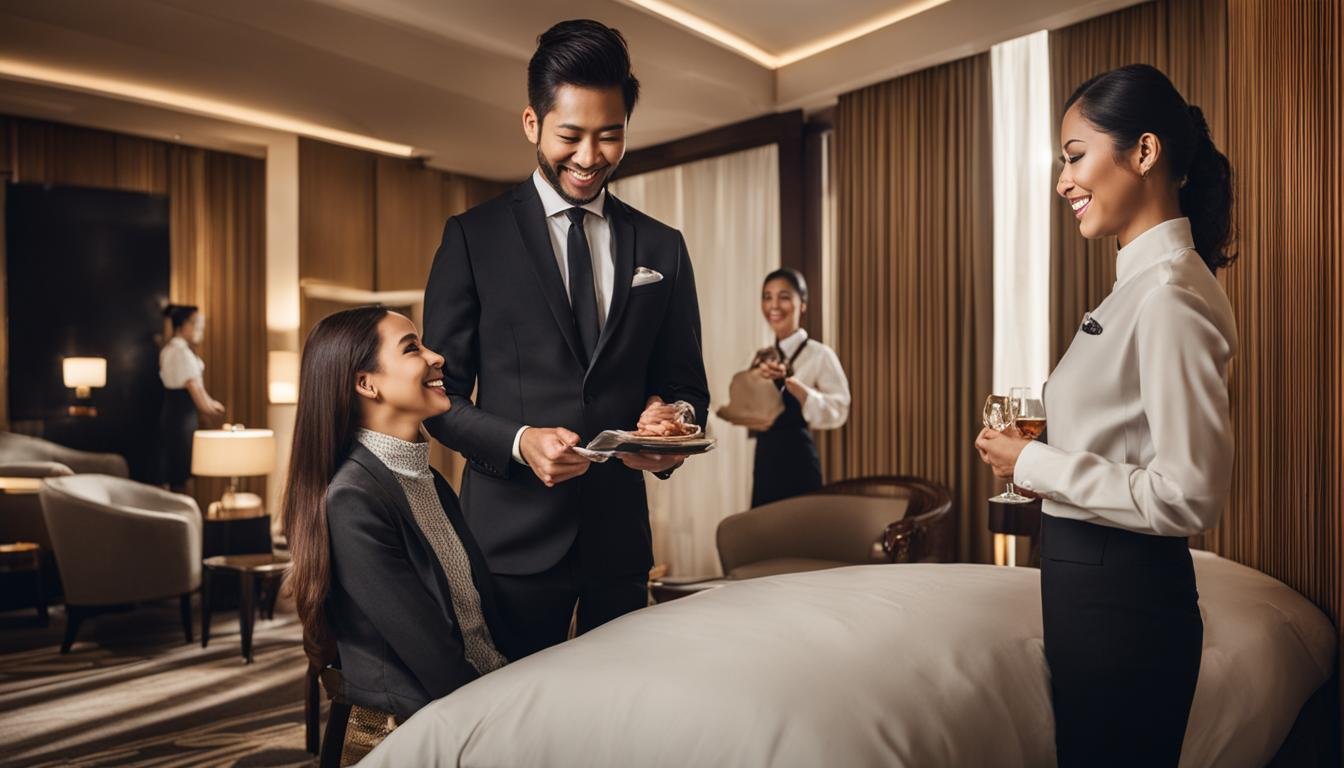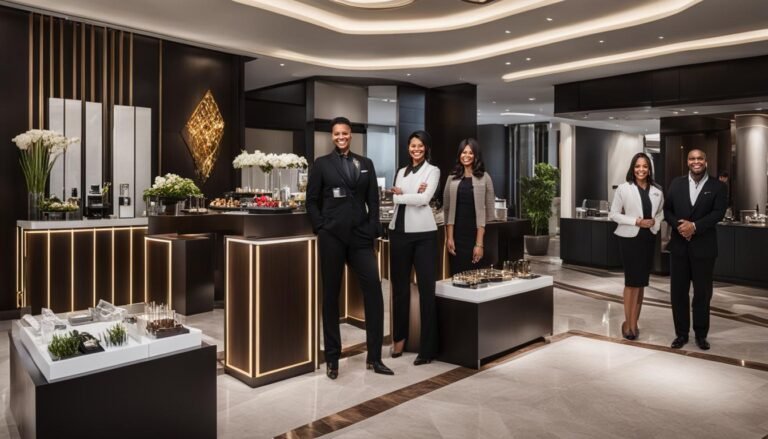Personalization: Key to Enhancing Guest Experience
Personalization in the hospitality industry has become a game-changer when it comes to enhancing the guest experience. By tailoring content, messages, offers, and services to suit a guest’s lifestyle and preferences, hotels can create truly memorable stays that leave a lasting impression. Whether it’s targeted email advertising, unique landing pages, or individualized loyalty programs, personalization is the secret ingredient that takes hospitality to the next level.
Studies have shown that personalization can have a significant impact on guest satisfaction and loyalty. In fact, a recent report by Twilio revealed that 56 percent of consumers are likely to become repeat buyers after a personalized experience. It’s not just about making guests feel special; personalization also delivers tangible business results. Tailored offers can deliver an 8x return on marketing spend and increase sales by at least 10 percent.
In today’s competitive hospitality industry, personalization is no longer a luxury; it’s a necessity. Guests expect personalized services that cater to their unique needs and preferences. By embracing personalization, hotels can stand out from the competition, fostering stronger customer relationships, and ultimately driving customer satisfaction and loyalty.
Key Takeaways:
- Personalization plays a critical role in enhancing the guest experience in the hospitality industry.
- Tailoring content, messages, offers, and services to suit a guest’s lifestyle and preferences is crucial for successful personalization.
- Personalization can significantly impact guest satisfaction and loyalty, leading to repeat business and increased sales.
- Hotels should utilize targeted email advertising, unique landing pages, tailored product offers, omnichannel customer service, chatbots, push notifications, and individualized loyalty programs to personalize the guest experience.
- Embracing personalization is essential for hotels to stay competitive and foster stronger customer relationships.
What is Personalization in Hospitality?
Personalization in hospitality refers to the process of tailoring content, messages, offers, and services to suit a guest’s lifestyle, preferences, and requirements. It goes beyond offline interactions at arrival and can be applied at different steps of the customer journey. Personalization in the hotel context can include targeted email advertising, unique landing pages, tailored product offers, omnichannel customer service, chatbots, push notifications, and individualized loyalty programs.
Benefits of Personalization in Hospitality:
- Enhancing guest satisfaction and loyalty
- Increasing sales and revenue
- Creating a meaningful and long-lasting relationship between the guest and the brand
According to the Twilio report, 56 percent of consumers are likely to become repeat buyers after a personalization experience. The State of Personalization Maturity in Travel and Dining report confirms that personalization can increase conversion, revenue per visitor, and average order value. Personalization also saves time and simplifies the decision-making process for guests.
Personalization in hospitality offers several benefits to both guests and businesses. By understanding and meeting individual guest preferences, hotels can enhance the overall experience, leading to higher satisfaction and loyalty. This, in turn, can result in increased revenue and customer retention. Personalization also simplifies the decision-making process for guests, allowing them to easily find the services and offers that align with their needs and preferences.
Moreover, personalization enables hotels to create meaningful and long-lasting relationships with their guests. By tailoring content, messages, and offers, hotels can show that they understand and care about their guests’ needs, fostering a sense of connection and trust. This can lead to not only repeat bookings but also positive word-of-mouth recommendations and brand advocacy.
The Benefits of Personalization in Hospitality
Personalization in hospitality offers several benefits that contribute to enhancing guest satisfaction, increasing revenue, and building strong guest relationships. By tailoring content, messages, offers, and services to suit a guest’s lifestyle, preferences, and requirements, hotels can create a personalized experience that resonates with each individual. This personalized approach not only improves the overall guest experience but also leads to higher guest satisfaction and loyalty.
A significant benefit of personalization in hospitality is the ability to increase sales and revenue. According to the Twilio report, 56 percent of consumers are likely to become repeat buyers after a personalization experience. By offering tailored product offers, targeted email advertising, and individualized loyalty programs, hotels can significantly impact their sales and bottom line. Moreover, a personalized approach can deliver an 8x return on marketing spend, further increasing the revenue generated from such initiatives.
Another advantage of personalization is the creation of a meaningful and long-lasting relationship between the guest and the brand. When hotels personalize the guest experience by considering their preferences, interests, and needs, it creates a sense of connection and demonstrates that the hotel values their individuality. This personalized attention fosters trust, loyalty, and a positive perception of the brand, which ultimately leads to repeat visits and positive word-of-mouth recommendations.
| Benefits of Personalization in Hospitality |
|---|
| Enhanced guest satisfaction |
| Increased sales and revenue |
| Stronger guest relationships |
Overall, personalization in hospitality has numerous benefits that contribute to the success of a hotel. From enhancing guest satisfaction and loyalty to increasing sales and revenue, personalized experiences have a significant impact on the guest’s perception of a brand. By leveraging technology, collecting guest data, and implementing personalized strategies, hotels can elevate the guest experience and differentiate themselves in the competitive hospitality industry.
The Personalization Maturity Curve in Hospitality
Personalization in hospitality is not a one-size-fits-all approach. Instead, it follows a maturity curve, ranging from basic personalization to hyper-personalization. Understanding this curve is crucial for hotels to tailor their strategies and deliver personalized experiences that meet the evolving expectations of guests.
The Stages of Personalization Maturity
Table: Personalization Maturity Curve in Hospitality
| Stage | Description |
|---|---|
| No Personalization | Hotels send the same marketing emails and offer the same discounts to all customers, without tailoring their approach to individual preferences. |
| Basic Personalization | Hotels include personal insertions in marketing emails and show offers and discounts based on generally known data, such as a guest’s name or past stays. |
| Segment-based Personalization | Hotels divide their target audience into smaller groups based on characteristics like demographics, psychographics, geography, and behavior. They then deliver more targeted marketing messages and offers to these segments. |
| Microsegmentation | Hotels combine characteristics from multiple segments to create tailored offers for specific groups of guests. This approach allows for more nuanced personalization and customization. |
| Hyper-personalization | Hotels deliver personalized experiences at an individual level, leveraging real-time data and advanced analytics. This level of personalization requires sophisticated technology and comprehensive guest profiles. |
Advancing Along the Curve
As hotels progress along the personalization maturity curve, they unlock the potential to provide more relevant, engaging, and memorable experiences for their guests. Each stage builds upon the previous one, with hyper-personalization representing the pinnacle of personalization in the hospitality industry.
Hotels can advance along the curve by investing in the right technologies, collecting and organizing guest data, and training employees to deliver personalized services. By doing so, they can create a competitive advantage, enhance guest satisfaction, and drive revenue growth in an increasingly dynamic and digitally-driven marketplace.
By understanding the personalization maturity curve and strategically implementing personalization initiatives, hotels can unlock the full potential of tailored experiences and cement their position as leaders in the industry.
Building Blocks for Personalization in Hospitality
Personalization in hospitality requires a solid foundation built on several key building blocks. These building blocks enable hotels and other hospitality establishments to deliver tailored experiences that leave a lasting impression on guests. From comprehensive guest profiles to the appropriate use of technologies, each element plays a crucial role in creating a personalized and memorable stay.
Comprehensive Guest Profiles
One of the essential building blocks for personalization is the collection and organization of guest data. Comprehensive guest profiles allow hotels to gather information about guest preferences, interests, special occasions, and more. By understanding their guests on a deeper level, hotels can tailor personalized offers, recommendations, and experiences that align with individual needs and expectations.
Granular Inventory
Granular inventory refers to a detailed understanding of a hotel’s available rooms and their specific features and attributes. By having a comprehensive overview of their inventory, hotels can offer more personalized options to guests. For example, if a guest prefers a room with a view or specific amenities, the hotel can prioritize matching them with a suitable room, enhancing their overall experience.
Trip Context
Understanding guests’ needs and preferences during their stay is crucial for personalization. Hotels can leverage real-time data to provide personalized recommendations and offerings based on the context of the guest’s trip. Whether it’s suggesting nearby attractions, dining options, or activities that align with their interests, trip context ensures that guests receive tailored recommendations that enhance their stay.
Personalized Pricing
Personalized pricing takes into consideration market demand and guest requirements to offer tailored prices. By analyzing guest data and market trends, hotels can create pricing strategies that align with the individual needs and preferences of their guests. This approach not only enhances the guest experience but also fosters a sense of value and personalization.
Implementing the right technologies and involving employees and management are also crucial building blocks for successful personalization efforts. With a solid foundation in place, hotels can unlock the full potential of personalization and provide truly exceptional and tailored experiences to their guests.
7 Ways to Personalize the Guest Experience in Hospitality
Personalization is a powerful tool in the hospitality industry that can significantly enhance the guest experience. By tailoring services and offerings to meet individual preferences and needs, hotels can create memorable and personalized experiences that leave a lasting impression. Here are seven effective ways to personalize the guest experience in hospitality:
- Tailored Services: Customize spa treatments, activities, dining options, and other offerings based on each guest’s preferences. By understanding their unique preferences, hotels can create personalized experiences that cater to their individual tastes and interests.
- Loyalty Programs: Offer personalized benefits to loyalty program members, such as room upgrades, late check-outs, and exclusive discounts. By recognizing and rewarding loyal guests, hotels can strengthen their relationship and foster a sense of exclusivity.
- Effective Communication: Regularly check in with guests throughout their stay to ensure their needs are being met. Personalized emails and messages can also be used to provide relevant information and offers based on their preferences and past interactions.
- Guest Profiles: Build comprehensive guest profiles to gather information about their preferences, past stays, and special occasions. This data can then be used to personalize offers and recommendations, creating a more tailored and personalized experience.
- Special Occasions: Celebrate guests’ milestones and special occasions, such as birthdays and anniversaries, by offering personalized surprises or amenities. This thoughtful gesture can go a long way in creating lasting memories and strengthening the guest’s emotional connection with the hotel.
- Training Staff: Train your staff to be attentive, empathetic, and proactive in anticipating guest needs. Encourage them to engage in personalized interactions and offer recommendations based on the guest’s preferences, ensuring a personalized and memorable experience.
- Insider Tips: Share insider tips and local activities with guests to enhance their overall experience. Providing them with personalized recommendations and insights into the local culture and attractions can make their stay more enjoyable and memorable.
These strategies can help hotels create a unique, personalized experience for each guest, fostering loyalty and enhancing guest satisfaction. By implementing these personalized approaches, hotels can differentiate themselves in a competitive market and leave a lasting impression on their guests.
Build Guest Profiles by Collecting the Right Data
Building guest profiles is a crucial step in personalizing the guest experience in the hospitality industry. By collecting and organizing the right data, hotels can gain valuable insights into guest preferences, interests, and behaviors, allowing them to tailor their offerings and communications accordingly.
To build comprehensive guest profiles, hotels can start by gathering basic information such as names, contact details, and booking history. However, to truly personalize the guest experience, it’s important to go beyond the basics and collect additional data points. This can include preferences for room types, amenities, dining options, spa treatments, and recreational activities. Gathering data on special occasions like birthdays, anniversaries, or other milestones can also help hotels create memorable experiences that leave a lasting impact on guests.
Property management systems (PMS) and customer relationship management (CRM) platforms play a crucial role in aggregating and managing guest data. These systems allow hotels to store and analyze data in a centralized manner, making it easier to access and utilize the information effectively. By leveraging technology and the right data collection tools, hotels can build robust guest profiles that form the foundation for personalized marketing efforts and customized guest experiences.
The Importance of Data Collection
Data collection is not only about gathering information but also about understanding and using it to create meaningful connections with guests. By collecting data, hotels can better anticipate guest needs, preferences, and expectations, enabling them to offer personalized recommendations, tailored promotions, and exceptional service. Collecting the right data allows hotels to create more targeted marketing campaigns, resulting in higher conversion rates and increased customer satisfaction.
“Data collection is the foundation of personalization in hospitality. It enables hotels to create tailored experiences that leave a lasting impact on guests, increasing their satisfaction and loyalty.”
In conclusion, building guest profiles by collecting the right data is essential for implementing effective personalization strategies within the hospitality industry. By understanding guests on a deeper level, hotels can deliver personalized experiences that exceed expectations, foster long-term relationships, and drive business growth.
Implementing the Right Technologies
In order to enhance personalization efforts in the hospitality industry, it is crucial to implement the right technologies. These technologies not only streamline operations but also improve guest engagement and provide personalized recommendations. Some of the key technologies that can be utilized include:
- Chatbots: Implementing chatbot technology allows hotels to provide instant assistance to guests, answering their queries and addressing their needs in a timely manner. Chatbots can be programmed to personalize their responses based on guest profiles and preferences.
- Virtual Concierges: Virtual concierges offer a personalized touch to the guest experience by providing recommendations for local attractions, restaurants, and activities. They can also gather real-time data on guest preferences and tailor their suggestions accordingly.
- Contactless Solutions: With the increasing emphasis on health and safety, implementing contactless solutions, such as mobile check-in/check-out and keyless entry systems, not only improves guest convenience but also allows for personalized experiences by capturing guest preferences and requirements.
- Property Management Systems (PMS) and Customer Relationship Management (CRM) Platforms: These platforms play a crucial role in collecting and analyzing guest data for personalization. They allow hotels to manage guest profiles, track preferences and behaviors, and deliver targeted marketing campaigns.
By leveraging these technologies, hotels can effectively collect and analyze guest data, providing them with the tools needed to offer personalized experiences that enhance guest satisfaction and loyalty.
| Benefits of Implementing Technologies for Personalization |
|---|
| 1. Streamline operations |
| 2. Improve guest engagement |
| 3. Provide personalized recommendations |
| 4. Capture and analyze guest data |
| 5. Enhance guest satisfaction and loyalty |
Implementing the right technologies is an essential step in the personalization journey of hotels. It empowers them to deliver tailored experiences that meet the unique needs and preferences of each guest, ultimately driving guest satisfaction and loyalty in the highly competitive hospitality industry.
Set Up Pre-arrival & Post-Departure Guest Surveys
To gather valuable feedback and personalize the guest experience, it is essential to set up pre-arrival and post-departure guest surveys. These surveys provide opportunities to understand guests’ needs, preferences, and expectations, enabling hotels to tailor their services accordingly. When implemented effectively, pre-arrival and post-departure surveys can significantly enhance guest satisfaction and improve overall guest experience.
Pre-arrival surveys are typically sent to guests before their arrival at the hotel. They can be triggered by specific events or interactions, such as booking confirmation or pre-arrival communication. Pre-arrival surveys allow guests to provide information about their preferences, such as room location, amenities, dietary requirements, and any special requests they may have. This data helps hotels prepare in advance, ensuring a personalized and seamless check-in process.
Post-departure surveys, on the other hand, are sent to guests after their stay. These surveys capture guests’ feedback on various aspects of their experience, including the quality of service, cleanliness, facilities, and overall satisfaction. Hotels can use this feedback to identify areas for improvement and address any issues raised by guests. Post-departure surveys also provide an opportunity to express gratitude and invite guests to share their positive experiences through online reviews or social media.
By implementing pre-arrival and post-departure guest surveys, hotels can gain valuable insights, identify areas for improvement, and personalize the guest experience based on individual preferences. These surveys not only allow hotels to enhance guest satisfaction but also build stronger relationships with guests, leading to increased loyalty and positive word-of-mouth recommendations.
Encourage Relationships and Build a Feedback Loop
In order to enhance personalization efforts in the hospitality industry, it is crucial to encourage relationships with guests and establish a feedback loop. By engaging with guests on a personal level and actively listening to their feedback, hotels can build trust, improve the guest experience, and foster loyalty.
One way to encourage relationships with guests is to provide personalized attention throughout their stay. This can include remembering their preferences, offering tailored recommendations, and anticipating their needs. By going above and beyond to make guests feel valued and understood, hotels can create a lasting impression that sets them apart from competitors.
Additionally, establishing a feedback loop is essential for continuous improvement. Hotels should actively seek feedback from guests through surveys, online reviews, and direct communication. This feedback should be analyzed and used to make necessary adjustments and enhancements to the guest experience. By incorporating guest feedback into decision-making processes, hotels can demonstrate that they value guest opinions and are committed to providing exceptional personalized service.
“Building relationships with guests and creating a feedback loop is essential for personalization. Engaging with guests on a personal level and listening to their feedback helps establish trust and improve the guest experience.”
Overall, the key to successful personalization in hospitality lies in the establishment of strong guest relationships and the implementation of a feedback loop. By prioritizing personalized attention and actively seeking guest feedback, hotels can create memorable experiences, enhance guest satisfaction, and foster long-term loyalty.
Conclusion
Personalization is not just a buzzword in the hospitality industry; it is the key to enhancing the guest experience. By tailoring services, harnessing the power of technology, and collecting valuable guest data, hotels can create personalized experiences that leave a lasting impact. This, in turn, leads to increased guest satisfaction, loyalty, and ultimately, revenue.
Building comprehensive guest profiles is essential for understanding individual preferences and tailoring offerings accordingly. By having a deep understanding of each guest’s needs, hotels can go beyond expectations and provide truly personalized services. Additionally, involving employees and management in the personalization process ensures that every touchpoint with the guest is carefully curated to exceed their expectations.
Implementing the right technologies, such as chatbots and virtual concierges, enables hotels to enhance guest engagement and provide personalized recommendations. These technologies streamline operations and make it easier to collect and analyze guest data, allowing for more targeted and effective personalization efforts.
In conclusion, personalization is the future of the hospitality industry. By adopting personalized approaches, hotels can build strong guest relationships, increase guest satisfaction and loyalty, and ultimately drive revenue growth. The power of personalization lies in making every guest feel special and valued, creating experiences that leave a lasting impression.







